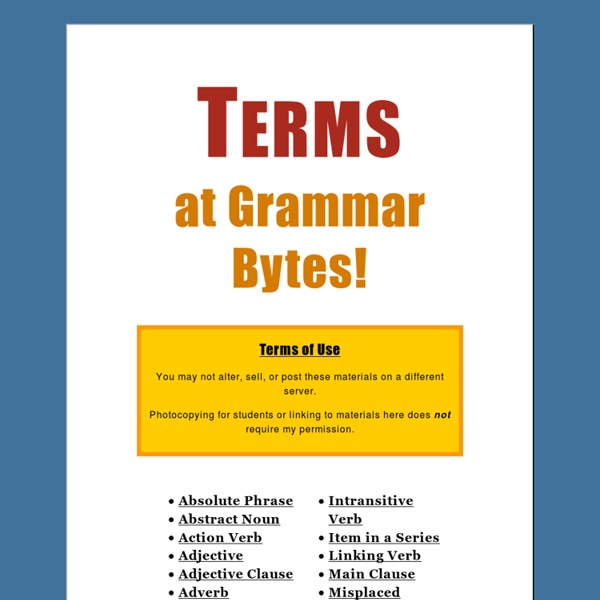



English Grammar – Your guide to error-free writing Games Crossword GameJust like an old-fashioned word search! Using the mouse and the wordlist, find and highlight the hidden English words in the box! As the levels get harder, the words start appearing in different orientations. But hurry, the clock is running!
English Worksheets All Things Grammar - Home English Grammar Tests for ESL Students - English Grammar Practice Quizzes Welcome to our English grammar training section, a good place to practice and improve your knowledge of English grammar. The quizzes come in three levels: beginner, intermediate, and advanced. The topics covered include verb tenses, phrasal verbs, articles, prepositions, noun clauses, and much more. (B) = Beginner; (I) = Intermediate; (A) = Advanced VERB TENSES (Tests/Quizzes): Commands (Imperative) 1 (B/I)Commands (Imperative) 2 (B/I)Commands (Imperative) 3 (B/I)The Present Continuous 1 (B)Simple Past/Past Continuous? EXERCISES TO IMPROVE YOUR ENGLISH WRITING SKILLS (ADVANCED) Whether you're a native speaker of English or an advanced ESL student, these practice tests will help you to recognize and eliminate common grammar errors. COUNTABLE (COUNT) or UNCOUNTABLE (NONCOUNT) NOUNS: USED TO, BE USED TO, WOULD 1 (B/I)WOULD YOU LIKE or DO YOU LIKE?
.facebook 1416206495831 7 Great Grammar Sites for Teachers and Students June , 2014 Today I am sharing with you a list of some useful websites you can use with your students to help them better improve their grammar knowledge and polish their writing skill. From grammar lessons and teaching materials to free downloadable worksheets and presentations, this collection of websites will provide you with the content you need for teaching grammar. 1- Grammar Bytes Grammar Bytes is a great website that is packed full of teaching materials teachers can use to teach grammar.Grammar Bytes provides a glossary of common terms, fun interactive activities and exercises for students to test their grammar knowledge,instructional presentations and tons of tips on teaching grammar. 2- Road to Grammar Road to Grammar is a free website that provides a wide vareity of resources for teaching grammar. 3- Grammar Gold Grammar Gold provides grammar practice for grades 1 to 5.You can click on any of the grades to access the grammar lessons it features. 4- Grammar Snack
Planning a grammar lesson By teaching grammar we not only give our students the means to express themselves, but we also fulfil their expectations of what learning a foreign language involves. Fortunately, nowadays with the emphasis on a communicative approach and a wealth of stimulating resources, teaching grammar does not necessarily mean endless conjugation of verbs or grammar translation. Which approach? Presentation, practice and production (PPP) PresentationPresentation Practice Production Conclusion Which approach? There are two main approaches to teaching grammar. A deductive approach is when the rule is presented and the language is produced based on the rule. In other words, the former is more teacher centred and the latter more learner centred. Presentation, practice and production (PPP) A deductive approach often fits into a lesson structure known as PPP (Presentation, Practice, Production). In a 60-minute lesson each stage would last approximately 20 minutes. PPP is one model for planning a lesson.
English Grammar Online - free exercises, explanations, vocabulary, dictionary and teaching materials Who or Whom? It’s Not As Hard As You Think | Grammarly Whom should be used to refer to the object of a verb or preposition. When in doubt, try this simple trick: If you can replace the word with “he”’ or “’she,” use who. If you can replace it with “him” or “her,” use whom. Who should be used to refer to the subject of a sentence.Whom should be used to refer to the object of a verb or preposition. Who or whom? If you’re like most English speakers, you know that there’s a difference between these pronouns, but you aren’t sure what that difference is. Here’s a tip: Want to make sure your writing always looks great? Confused about who and whom? Let Grammarly help you choose the right word. Get Grammarly When to Use Who In a sentence, who is used as a subject. would like to go on vacation? made these awesome quesadillas? When to Use Whom Whom is used as the object of a verb or preposition. To was the letter addressed? I do not know with I will go to the prom. The Difference Between Who and Whom ate my sandwich? Let’s look at another: Who vs.